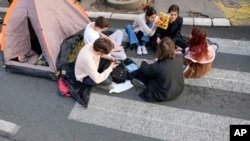A group of university students Friday launched a 24-hour blockade of a main street in Serbia’s capital during New Year’s holiday rush as protests continued in the troubled Balkan country after reports of irregularities that marred a recent election.
The students set up small tents, tables and chairs, brought food and blankets and played loud music at their makeshift camp near the government headquarters in Belgrade, saying they will stay put until the start of another opposition gathering planned for Saturday.
The student actions triggered a huge traffic gridlock in the capital Friday.
The Saturday rally is expected to draw thousands of people as political tensions are running high over the December 17 ballot and subsequent incidents and arrests of opposition supporters at a protest last weekend.
Populist President Aleksander Vucic has accused the opposition of inciting violence with an aim to overthrow the government under instructions from abroad, which opposition leaders have denied.
Vucic’s ruling Serbian Progressive Party has been declared the winner of the parliamentary and local elections, but the main opposition alliance, Serbia Against Violence, has alleged that fraud took place, particularly in Belgrade.
“I am here to fight for democracy in this country, for repeating the elections in fair conditions,” student Aleta Cacic said at Friday’s protest.
Opposition protests daily
Serbia Against Violence has been leading daily protests in Serbia since the vote as some politicians launched hunger strikes. The populists have said the vote was fair and rejected criticism, including from international observers who noted multiple irregularities in their preliminary findings published a day after the ballot.
Tensions soared Sunday evening, when protesters tried to enter Belgrade city hall, breaking windows before riot police pushed them back using tear gas, pepper spray and batons. Police detained at least 38 people, mostly students, many of whom were later slapped with a 30-day detention.
Opposition leader Dragan Djilas denied allegations Friday leveled by pro-government tabloids that the opposition was planning incidents at the rally planned for Saturday.
“No one is planning any violence,” he said. “We will not accept stolen elections and we will fight with all democratic methods.”
Watchdogs report vote-buying
The opposition has urged an international probe of the vote after representatives of several international rights watchdogs observing the elections reported multiple irregularities, including cases of vote-buying and ballot box stuffing.
They also noted unjust conditions for opposition candidates because of alleged mainstream media bias, abuse of public resources by the ruling party. They say Vucic dominated the ruling party’s campaign and media time allocated for candidates, even though he was not running himself.
Serbia is formally seeking membership in the European Union, but the Balkan nation has maintained close ties with Moscow and has refused to join Western sanctions imposed on Russia over the invasion of Ukraine.
Russia supports crackdown on protesters
Russian officials have extended full support to Vucic in the crackdown against the protesters and backed his claims that the vote was free and fair.
Russia’s Ambassador Alexander Botsan-Kharchenko has said that the protest Saturday and other planned opposition actions over the holidays represent “a very dangerous period” for “return of the violence” but added that Serbia’s authorities have full control of the situation.
The Moscow ties came into focus this week when Serbian Prime Minister Ana Brnabic thanked Russia’s security services for allegedly tipping off Serbia that violence was in the works.
Both Serbian and Russian officials have alleged a Western-backed ploy to stir political instability in Serbia like the 2014 pro-Western protests in Ukraine that resulted in the ouster of a pro-Russia leadership there.

